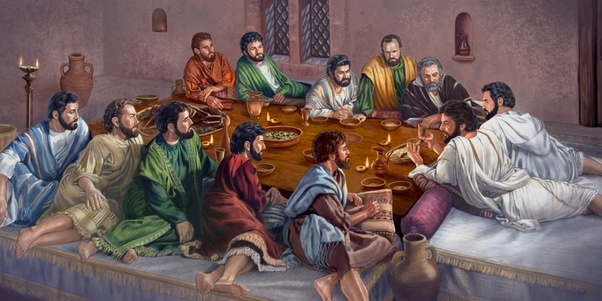MARK 2:13-17 MEDITATION - Part 3
At Home with Levi - The Ultimate Scandal
Levi did not hesitate to answer the call and Jesus did not hesitate to accept Levi’s invitation to his home to celebrate. A new friendship is born. Before this scene Jesus had already gathered together Simon, Andrew, James, John and now Levi. A motley bunch, not all of whom we would call ‘respectable’ people. Jesus is bringing together those who will form the first community on which the Church will be established. What characerises this community centred on Christ is the festive spirit, an atmosphere of joy and unity despite obvious differences. The Pharisees, who do not recognise their need for Christ, remain as hardened spectators, excluded from the community. The Church is open to everyone no matter who you are or what you are. The only ones who lie outside the festive spirit are those who want to.
As soon as Jesus calls Levi, he rises from his sitting position, leaves his job, follows Jesus and invites him home. This is the sequence of events. In moving from one scene to another, from the lake to the house of Levi, we notice another characteristic of the style of Mark’s Gospel. There is nothing in the narrative that prepares us for this change of scene. Nothing is said from the moment Levi joins Jesus to the scene of Jesus reclining at table at the home of Levi. This also contributes to the impression of swiftness created by the narrative, which bears us along inexorably as it develops.
One immediate effect of having met Jesus was the urge he felt to make him known to his friends and co-workers. There are three groups of people, the first group, composed of those who have decided to follow Jesus (including Levi), the second, made up of tax collectors and sinners, who are at ease with Jesus, enjoying a meal together and are potential disciples, and the third group hostile to Jesus, the Pharisees. By calling Levi Jesus has created a new network of relationships. We see here an effective form of evangelisation starting not from the synagogue, where they would never have entered, but from the home. Many parishes have been renewed using home-based evangelisation where friends and neigbours unite in informal gatherings around the word of God. When the word of God becomes active within us we are full of enthusiasm and involve others in our joy; “the mouth speaks from the abundance of the heart” (Luke 6:45).
The words “he reclined at table” and “were reclining with Jesus”, might sound a little strange to us. The normal posture while eating at table was ‘reclining’, lying down, rather than ‘sitting’ as in the image below.

Of the three groups present the only one out of place is the group of Pharisees. They are unrelated, they are the separate ones. In fact, the very word 'Pharisee' means the 'separate ones'. Jesus does not reject them, they reject him and do not recognise themselves as on a par with the sinners. They are the righteous ones, they are not sick, they have no need of the doctor, they are above the friends of the tax collector and above Jesus who, in their eyes, has contaminated himself by being in the company of the unclean. Their relationship with Jesus is hostile, totally unproductive.
Jesus was risking his reputation by eating with these people and he himself was something of an outcast in the eyes of the Pharisees. However, Jesus is not concerned about negative opinions people may have. He has no problem with this.
Jesus came for the likes of Levi, not for the holier-than-thou religious leaders, the Pharisees, Scribes and Sadducees; they did not recognise their need for him. They were too full of themselves, of their own righteousness to learn from Jesus, who associated with such low-class people! Jesus was looking for those with whom he could establish a fruitful relationship, for the sick, the overburdened. Following Jesus is not just for priests and religious it is for each one of us.
We have a second phase of hostility on the part of the religious leaders. In the episode of the healing of the paralytic they ask “Why does he speak that way” (Mark 2:7)? Now they ask “why does he act that way?” (v. 16). They did not criticise Jesus directly, but through the disciples. Jesus replies to them directly, “Those who are well have no need of a physician, but those who are sick. I came not to call the righteous, but sinners” (v. 17). The body of Christ, the Church, is a hospital for sinners, not a five star hotel for the self-sufficient, the self-righteous. The unbeliever can focus on whatever sickness there may be in the Church and see themselves in some way superior. He who is too easily scandalised like the Pharisees, has little self-knowledge.
In criticising Jesus and his followers the Pharisees erected a sort of self-defence mechanism much like some unbelievers that target Christians saying ‘that person who goes to church is worse than me’! Criticising others is a way of defending and exulting ourselves, again just like the Pharisees! This attitude blinds us to our own faults and blocks the work of God in our lives. Yet how often do we hear criticism of others in our communities! Jesus does not judge by appearances, “Do not judge by appearances, but judge with right judgement” (John 7:24). He goes deeper. If we are sincere we can see within ourselves something of both Levi and the Pharisees, which are we feeding more? Let us be sincere with ourselves. Are we aware of the presence of Christ in our daily lives? Are we listening to the gentle voice of Christ inviting us to follow him? Let us be listening disciples!
--------------------
Mark 2:18-22 meditation
Mark 2:13-17 Text and Questions
© copyright R W
bsgbiblestudyguide@gmail.com
